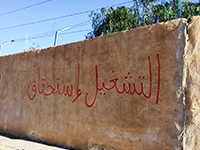Hopes for economic improvement after the overthrow of the Tunisian dictatorship in 2011 have not been fulfilled. Since 2015, waves of protest for work and better living conditions have grown stronger
In PRIF-Report No. 143 “The Quest for Social Justice in Tunisia. Socioeconomic protest and political democratization post 2011”, Jan-Philipp Vatthauer and Irene Weipert-Fenner use quantitative and qualitative methods to analyze who protests, by which means protests are carried out and which claims are made by protesters. Additionally, they explain why civil society actors have failed to mediate between politics and protests until now. They also show that a first step towards social justice in Tunisia could be including protesters into dialogue fora and reforming recruitment procedures.
Download (pdf, 600kb): Vatthauer, Jan-Philipp/Weipert-Fenner, Irene (2017): The Quest for Social Justice in Tunisia. Socioeconomic protest and political democratization post 2011, PRIF Report No. 143, Frankfurt/M.
The Report can be ordered at PRIF for 10 €.
The Report is part of the project „Socioeconomic Protests and Political Transformation: Dynamics of Contentious Politics in Egypt and Tunisia Against the Background of South American Experiences“.
